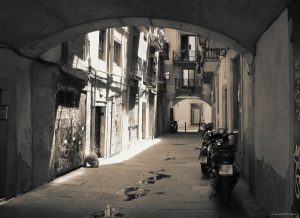

If La Sagrada Família is the emblem of Modernist Barcelona, then the Ciutat Vella or ‘Old Town’ of Barcelona is still the heart of the ancient city and its main tourist hub. Here you can wander back in time through medieval alleyways, visit world-class museums and art galleries, dine in style and stroll along the main tourist thoroughfare of La Rambla to the sea front. Here is ShBarcelona’s guide to the best of Barcelona’s old town.
Table of Contents


Photo by SantiMB.Photos via Visualhunt
Today the Ciutat Vella comprises the barris (neighbourhoods) of El Gotic, La Ribera, El Raval and Barceloneta. The district was bounded by fortified medieval walls until the late 19th century when they were knocked down to allow the creation of the Eixample district, which would accommodate the city’s burgeoning population. The Roman city of Barcino lies beneath the Gothic quarter, and on top of this, the medieval city developed. Remains of Barcelona’s ancient past can be glimpsed throughout the area and with its excellent tapas bars and boutique shopping, the Old Town represents both an old and modern part of the city.
The main difficulty in pointing out the highlights of the area is that there are so many. However, if your time in Barcelona is limited, make sure you don’t miss the following:
La Rambla
You may have heard La Rambla is the tourist, souvenir stall and pickpocket central of the city, but it’s still Barcelona’s most iconic thoroughfare. La Rambla runs like a river from the Plaça Catalunya down to the sea, where it extends into the Rambla del Mar thanks to a recently-built wooden walkway leading to the Maremagnum shopping center. Here you can indulge your shopping habit and find plenty of places to eat and drink. On the way down, don’t miss the Mercat de Sant Joseph (La Boqueria) and the often-overlooked Miró mosaic outside the Gran Teatre del Liceu. There are many restaurants along the street but you’ll pay a high premium to sip beer from a big glass and sample mediocre tapas here. So save your pennies and your taste buds for Barceloneta!
Related article: Why You Should Consider an Off-Season trip to Barcelona
Barri Gotic
Photo by SantiMB.Photos via Visualhunt
Lying to the east of La Rambla, highlights of this area include the stunning Catalan Gothic Cathedral, Museu Frederic Mares and MUHBA Plaça del Rei. The best time to visit is the evening when the narrow winding alleyways are filled with guitar melodies, classical violin and even opera. The quality of street entertainment around this area is second-to-none.
La Ribera
This area is home to the Palau de La Música Catalana and the Museu Picasso. You also can see what the area looked like before the siege of 1714 in the El Born Centre de Cultura i Memòria where archaeological remains from this era have been well-preserved below the former market building. If you’re looking for excellent tapas, cups overflowing with cava and a lively local crowd, head to El Xampanyet – but be prepared to wait for a table. Tourists and locals are welcomed with open arms. Another must-see in this area is the basilica of Santa Maria del Mar, a stunningly beautiful example of Catalan Gothic architecture.
Barceloneta
Photo by :IRONIC: via Visualhunt
This is a haven for seafood lovers and those who love to sip cocktails at the seafront whilst watching the world go by. Barceloneta has long been the home of the city’s fishermen and it retains its own identity and charm to this day. Narrow streets with tall Italianate buildings, bustling squares and the smell of fish in the streets. Highlights include many excellent seafood restaurants and the Museu d’Història de Catalunya.
Related article: Best restaurants in Barceloneta
El Raval
El Raval lies to the west of La Rambla. Home to a large Asian community, the streets are lined with Indian restaurants and spice shops. Its a great place to head if you’re a fan of Indian cuisine. Here you will also find the Palau Güell (one of Gaudí’s early masterpieces) and Barcelona’s contemporary art museum, MACBA. The Museu Marítim is located in the former royal shipyards and is also well worth a visit.
With so much to see in this area, a comfortable place to rest at the end of the day is a must, so check out ShBarcelona’s website for all of your accommodation needs.
Barcelona’s Mediterranean climate, with increasingly warmer and longer summers, makes air conditioning an essential feature…
Maybe you're thinking about selling a property or you've just inherited one or more real…
Do you enjoy strolling among trees and plants, away from the hustle and bustle of…
If you are planning to move to Barcelona for a few months or permanently, one…
ShBarcelona establishes itself as the leading agency within the Apialia Eixample Group, reaffirming its position…
Are you going to visit Barcelona this 2025? The vibrant Catalan capital once again becomes…